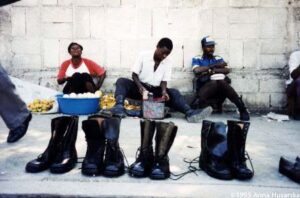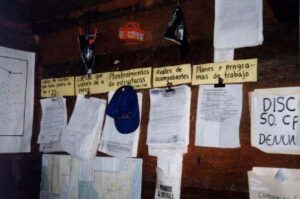Anna Husarska
- 1995

Fellowship Title:
- The Politics of Memory in New Democracies
Fellowship Year:
- 1995

Does Haitian Justice Have to be an Oxymoron?
It was in a US military helicopter going from Port-au-Prince to Hinche that I first met a representative of the Haitian justice after the return of the exiled president Jean-Bertrand Aristide was made possible by the soft-entry invasion of US troops in Haiti in September 1994. If there is no more army, who needs the military boots? They are for sale on the streets of Port-au-Prince. The director of the Agency for International Development (USAID), Brian Atwood, was going on a visit to inspect programs funded by AID and – knowing the terrible state of the road to Hinche – offered a few seats on the copter to journalists and one to Monsieur Ernst Mallebranche, the new Haitian minister of Justice who wanted to solve a case pending in the Hinche tribunal. The presence of the Minister lured me onto that trip. I hoped to have a few relaxed moments with him because I was warned that he is an extremely stiff and formal man. A conversation with the Minister at that very moment had

The Mayan Apparatchiks
When the Guatemalan president-elect Alvaro Arzú promised on January 7 that his government “will be one of total and absolute respect for human rights,” the announcement had a novel ring to it that on second thought was rather chilling. Mr. Arzú led his rival, Adolfo Portillo of the Guatemalan Republican Front or FRG, by only 31,950 votes. Given that FRG’s founder and leader, General Efraín Ríos Montt was responsible for massacres in Indian villages during the 1980’s, Mr. Arzú’s victory allowed the human rights community to sigh with relief. But whether the new president will be able to keep his promise and bring an end to the killing of civilians depends mostly on his handling of the military. The office of fugitive Mayan Indians called Community of Population in Resistance (CPR) has mixed influences: the filing system is Western-style, but the names and categories seem copied from a Politburo manual. The 35-year-old Guatemalan civil war is the longest in Latin America and also the most under-reported. The media showed interest in the country when Guatemala
